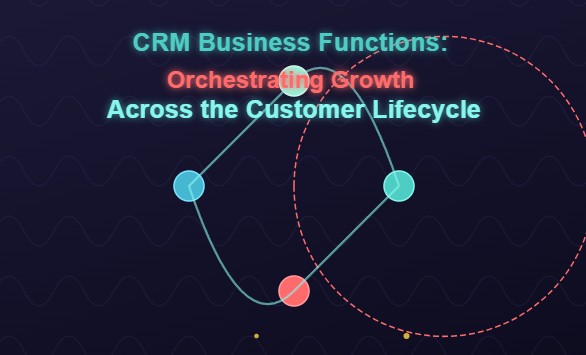In a fast-evolving business environment where customers expect hyper-personalization, instant response, and seamless service, having a Customer Relationship Management (CRM) system is not enough. The real differentiator lies in how well an organization leverages its CRM Business Functions—the core operational capabilities embedded within the CRM platform that drive engagement, revenue, retention, and innovation.
In this in-depth exploration, we uncover the most critical CRM business functions, how they align with enterprise goals, and how modern CRM platforms are reshaping how businesses interact with their customers across marketing, sales, service, and beyond.
Table of Contents
🧠 What Are CRM Business Functions?
CRM Business Functions refer to the structured, strategic activities that a CRM system enables within an organization. These functions are designed to:
-
Acquire new customers
-
Convert leads into opportunities
-
Retain and delight existing clients
-
Optimize internal processes
-
Generate real-time insights
They are not just software features; they are digital representations of real-world business processes, configured to execute more efficiently, consistently, and intelligently using CRM platforms.
🔍 Why CRM Business Functions Matter
Let’s be clear: CRM is not just a customer database. The true power of CRM lies in its ability to orchestrate key business functions across departments and customer touchpoints. Here’s why these functions are mission-critical:
-
📈 Drive Revenue: Structured sales functions accelerate deal velocity.
-
🎯 Increase Precision: Marketing functions enable highly targeted campaigns.
-
👥 Improve Customer Retention: Service and support functions drive satisfaction.
-
🛠️ Streamline Operations: Workflow automation functions reduce manual tasks.
-
🔍 Enhance Decision-Making: Analytical functions reveal trends, risks, and opportunities.
🧩 Top CRM Business Functions Explained
Let’s dive into the most vital CRM functions that modern businesses rely on:
1. 🛒 Sales Management
At the heart of every CRM is the ability to manage and optimize the sales process. This function ensures that sales reps stay organized, efficient, and focused on closing deals.
Core Activities:
-
Lead qualification and scoring
-
Opportunity and pipeline tracking
-
Quotation and proposal generation
-
Task and activity scheduling
-
Sales performance reporting
Value:
Automates and structures sales workflows, ensures nothing falls through the cracks, and improves win rates.
2. 📣 Marketing Campaign Management
CRM empowers marketers to plan, execute, and analyze campaigns from a centralized interface.
Core Activities:
-
Audience segmentation
-
Email and SMS campaign creation
-
Drip campaigns and nurture sequences
-
Social media integration
-
ROI and conversion tracking
Value:
Delivers personalized, data-driven campaigns that resonate with specific segments and improve lead quality.
3. 🎧 Customer Service and Support
This function focuses on enhancing post-sale experiences through issue resolution, self-service, and proactive engagement.
Core Activities:
-
Case creation and management
-
SLA monitoring and escalation rules
-
Knowledge base and chatbot integration
-
Omnichannel support (chat, phone, email)
-
CSAT and NPS tracking
Value:
Builds long-term customer trust and loyalty through rapid, context-aware support experiences.
4. 📊 Customer Data and Relationship Intelligence
Beyond managing names and emails, CRMs enable businesses to capture, enrich, and analyze customer data at scale.
Core Activities:
-
360° customer profiles
-
Behavioral and demographic data
-
Purchase history tracking
-
Relationship scoring and trend detection
-
Predictive analytics and churn forecasting
Value:
Empowers organizations to understand customers on a deeper level and personalize interactions accordingly.
5. 🔄 Workflow and Process Automation
One of the most powerful CRM functions is the ability to automate repetitive business processes, reducing manual effort and human error.
Core Activities:
-
Lead assignment rules
-
Auto-triggered follow-up emails
-
Sales approval workflows
-
Task reminders and alerts
-
Multi-step process flows
Value:
Frees up teams to focus on value-generating activities while maintaining consistency across departments.
6. 📦 Product and Inventory Management (CRM + ERP)
When CRM is integrated with ERP or inventory systems, businesses gain the ability to track and manage products, stock, and availability directly from customer-facing interfaces.
Core Activities:
-
Product catalog visibility
-
Price list management
-
Stock level monitoring
-
Integration with billing and order systems
Value:
Enables accurate quoting, real-time product updates, and faster order fulfillment.
7. 🔐 Security and Access Control
Data security is a built-in function of any enterprise-grade CRM, especially in regulated industries.
Core Activities:
-
Role-based access to modules and fields
-
User activity logs and audit trails
-
Field-level encryption
-
GDPR/CCPA compliance support
Value:
Protects sensitive data, ensures compliance, and promotes user accountability.
8. 📲 Mobile CRM Functions
With remote work and field sales on the rise, mobile CRM functions are essential.
Core Activities:
-
Mobile dashboards and reports
-
On-the-go task updates
-
Geolocation-based check-ins
-
Voice-to-text note taking
Value:
Keeps sales and service teams productive regardless of location or device.
9. 📈 Reporting and Business Intelligence
CRM platforms offer real-time dashboards, custom reports, and AI-powered analytics to guide strategy.
Core Activities:
-
Pipeline and conversion reporting
-
Forecast vs. actual comparison
-
Campaign analytics
-
Customer lifetime value (CLTV) trends
-
Custom KPI tracking
Value:
Transforms data into actionable insights, aligning operations with growth goals.
10. 🧱 Customization and App Building
Modern CRMs like Salesforce, Dynamics 365, and Zoho provide low-code platforms to tailor functions to your specific needs.
Core Activities:
-
Custom modules and fields
-
Business rule engines
-
App builder tools
-
Integration with APIs and third-party services
Value:
Lets organizations shape their CRM around unique workflows without deep technical expertise.
🏭 Use Case Examples Across Industries
Retail & eCommerce
-
Manage seasonal campaigns
-
Trigger product recommendations based on browsing history
-
Track lifetime spend of loyalty members
Healthcare
-
Automate patient follow-ups
-
Securely log appointment history
-
Segment based on care needs
B2B Services
-
Track multi-stage sales proposals
-
Manage recurring contracts
-
Centralize client feedback
Manufacturing
-
Route quotes to finance after sales approval
-
Track service requests from distributors
-
Sync order status to sales team automatically
🧠 How to Choose the Right CRM Functions for Your Business
Not every business needs every function. Use these questions to guide your CRM architecture:
-
What is your primary CRM goal: growth, retention, efficiency, compliance?
-
Which departments will use the system?
-
What legacy systems need to be integrated?
-
What processes can be automated to save time and reduce errors?
-
Do you need mobility, AI, or self-service?
🔮 Future Trends in CRM Business Functions
CRM business functions are rapidly evolving to meet next-gen demands. Expect:
-
AI co-pilots: Suggesting actions, writing emails, forecasting outcomes
-
Voice-first CRM: Controlling your CRM via Alexa, Siri, or Cortana
-
Augmented analytics: Auto-surfacing insights and anomalies
-
Composable CRMs: Plug-and-play functions tailored to micro industries
-
Metaverse-ready CRM: For immersive product demos and support
🧠 Final Takeaway: CRM as a Business Nerve Center
CRM systems are no longer just about “relationships”—they are the operational backbone for customer-centric organizations. From lead to loyalty, from marketing to inventory, CRM business functions power the most critical workflows of modern businesses.
Understanding, customizing, and maximizing these functions isn’t just IT work—it’s a strategic investment in efficiency, insight, and growth.
In a digital economy, those who master CRM business functions master the market.
SEO Keywords: CRM business functions, CRM capabilities, customer lifecycle management, CRM workflows, CRM for sales, CRM automation, CRM reporting tools, CRM mobile access, CRM customization, CRM future trends
🧠 Want this article as:
-
📄 A formatted WordPress blog post?
-
📦 A downloadable PDF for your business proposal?
-
🔧 A diagram showing how functions connect across teams?




